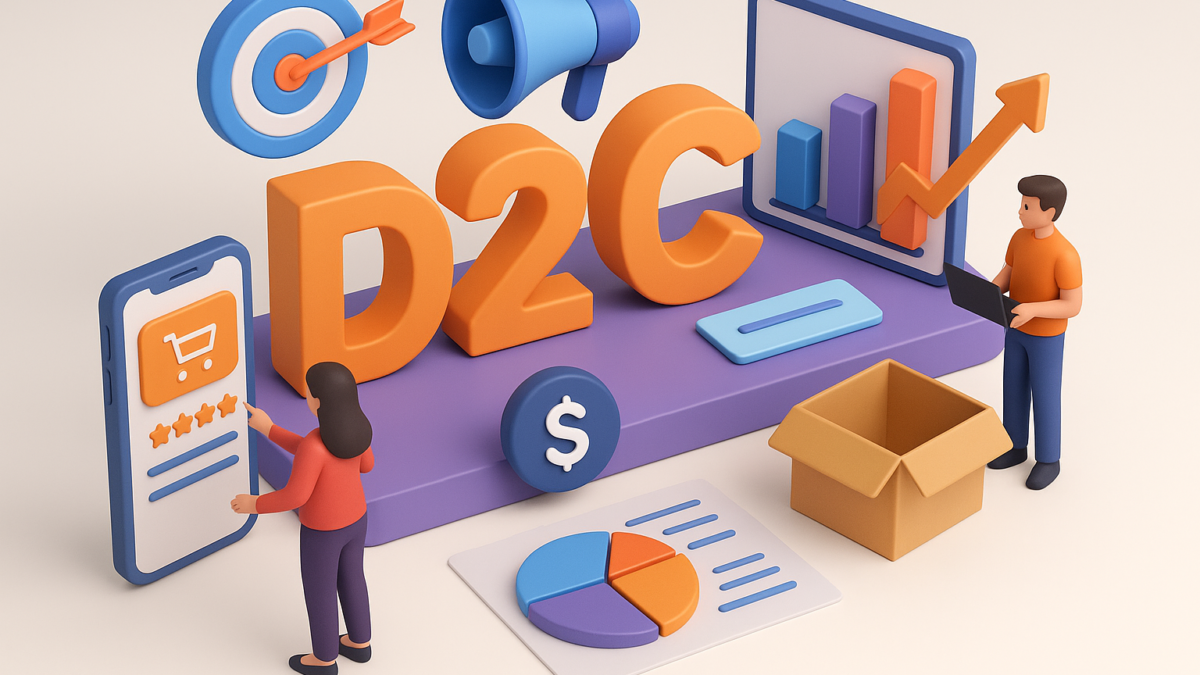What Is D2C Marketing? Strategies, Benefits, and Future Trends in 2025
Introduction
Over the past decade, the rise of Direct-to-Consumer (D2C) marketing has disrupted traditional business models. Brands that once relied heavily on retailers, distributors, and middlemen are now connecting with customers directly through digital platforms, social media, and eCommerce.
From global players like Nike and Warby Parker to local D2C startups, this model has transformed how products are marketed, sold, and consumed. But what exactly is D2C marketing, why has it become so popular, and what does the future hold in 2025? Let’s dive in.
What Is D2C Marketing?

D2C marketing (Direct-to-Consumer marketing) is a strategy where brands promote and sell their products directly to customers, bypassing third-party retailers or intermediaries.
In this model, brands control the entire customer journey from branding and advertising to order fulfillment and after-sales support.
Examples of D2C marketing in action:
- A skincare brand selling through its website instead of a department store.
- A beverage company offering subscriptions directly to consumers.
- A clothing brand using Instagram and TikTok ads to sell products via its own app.
Why D2C Marketing Is Booming

1. Customer Relationships
D2C brands build direct connections with consumers, allowing for personalized communication and long-term loyalty.
2. Higher Margins
By eliminating middlemen, brands keep more revenue while offering competitive prices.
3. Data Ownership
D2C gives brands access to valuable first-party data—shopping behavior, preferences, and feedback—enabling smarter decisions.
4. Agility and Innovation
Without reliance on retail partners, D2C brands can launch products faster, test campaigns quicker, and pivot easily based on customer feedback.
Core Strategies of D2C Marketing

1. Social Media Marketing
Platforms like Instagram, TikTok, and LinkedIn are key drivers of D2C awareness. Creative content, influencer partnerships, and paid ads allow brands to connect with niche audiences.
2. Content Marketing
Blogs, videos, and email newsletters are central to building brand trust and educating customers. Many D2C brands use storytelling to showcase their mission and values.
3. eCommerce Platforms
From Shopify websites to mobile apps, strong eCommerce infrastructure is essential for smooth transactions, inventory management, and customer experience.
4. Personalization with Data
AI and analytics enable brands to send personalized recommendations, discounts, and product bundles, increasing conversion rates.
5. Subscription Models
Many D2C brands now offer subscriptions—beverages, health products, grooming kits—ensuring recurring revenue and customer retention.
Benefits of D2C Marketing
- Full Control of Branding: Companies dictate how products are marketed and presented.
- Direct Feedback Loop: Customer insights fuel continuous improvements.
- Customer Loyalty: Personalized engagement builds stronger relationships.
- Faster Time-to-Market: No dependence on retailers means quicker launches.
- Cost Efficiency: No distributor markups, leading to better margins.
Challenges in D2C Marketing
- High Competition: The D2C market is saturated, requiring differentiation.
- Customer Acquisition Costs (CAC): Paid ads are expensive, especially on social media.
- Logistics & Fulfillment: Managing shipping, returns, and customer service requires scale.
- Trust Building: New D2C brands must invest heavily in credibility to win over customers.
The Future of D2C Marketing in 2025 and Beyond
- AI-Powered Personalization: Expect smarter recommendation engines, predictive analytics, and dynamic pricing.
- Omnichannel Presence: While online-first, D2C brands will increasingly open pop-up shops or partner with physical retailers to expand reach.
- Community-Driven Brands: Successful D2C companies will build strong online communities around shared values and lifestyle.
- Sustainability as a Differentiator: Eco-friendly packaging and ethical sourcing will be major consumer decision factors.
- Voice and AR Shopping: With the rise of smart assistants and AR try-ons, D2C marketing will move into new immersive formats.
Conclusion
D2C marketing has redefined the relationship between brands and customers. By bypassing middlemen, brands gain control, insights, and direct engagement that fuel loyalty and growth.
In 2025, winning D2C brands will be those that balance innovation with trust, leveraging technology while staying authentic to their values.
Don’t chase leads attract the right ones. Explore our B2B lead generation services now.‘
See Also: Top Marketing Strategies for 2025: Trends, Tactics & Tools That Drive Results





